Unit 2 Lessons in life Using language课件(共41张,内嵌音频) 2024-2025学年高二英语外研版(2019)选择性必修4
文档属性
| 名称 | Unit 2 Lessons in life Using language课件(共41张,内嵌音频) 2024-2025学年高二英语外研版(2019)选择性必修4 |  | |
| 格式 | pptx | ||
| 文件大小 | 6.9MB | ||
| 资源类型 | 教案 | ||
| 版本资源 | 外研版(2019) | ||
| 科目 | 英语 | ||
| 更新时间 | 2025-04-23 16:25:14 | ||
图片预览

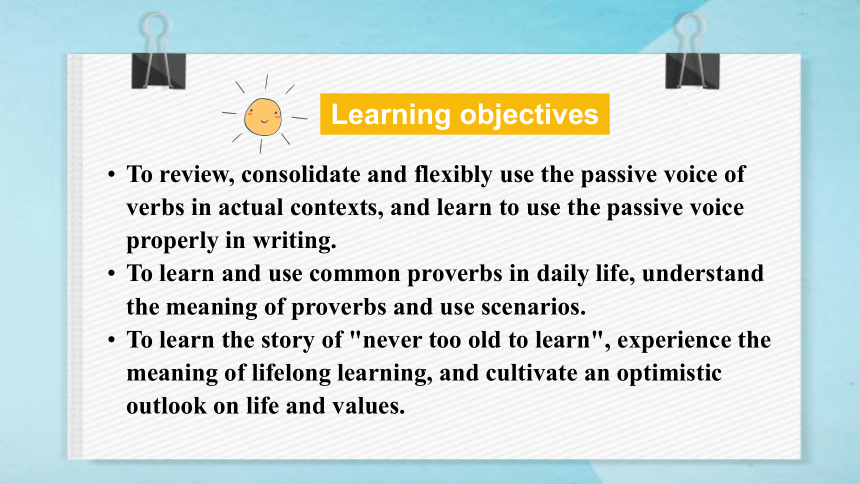
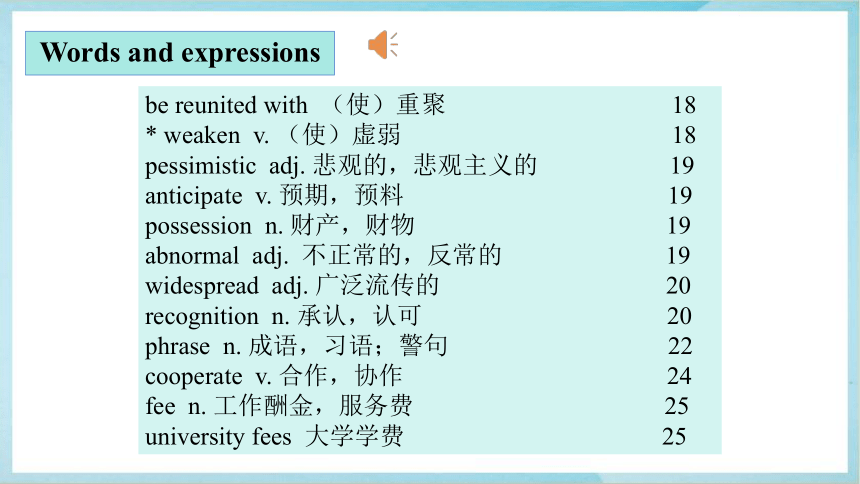
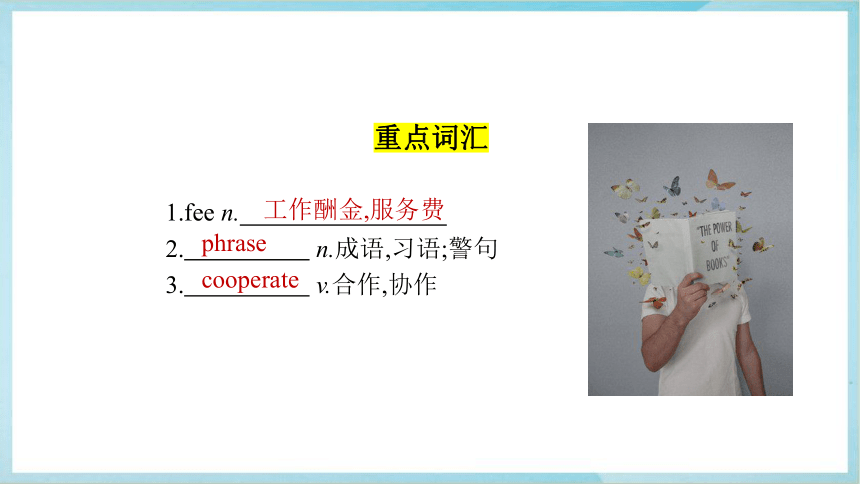
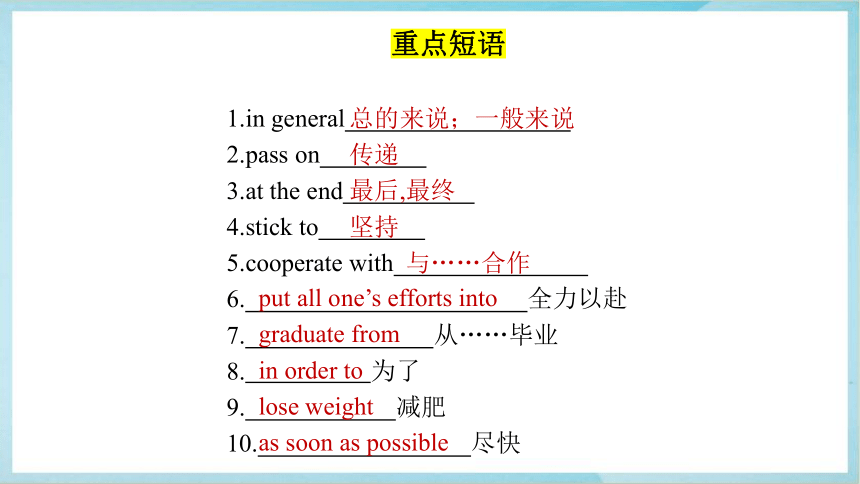

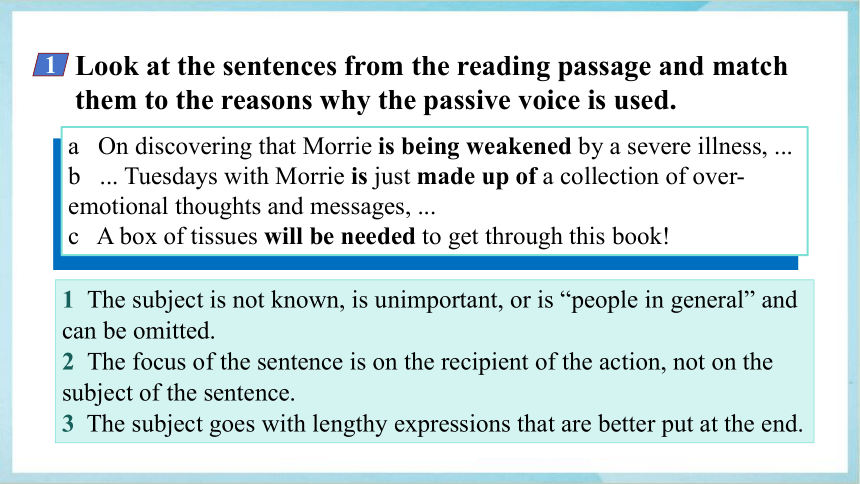

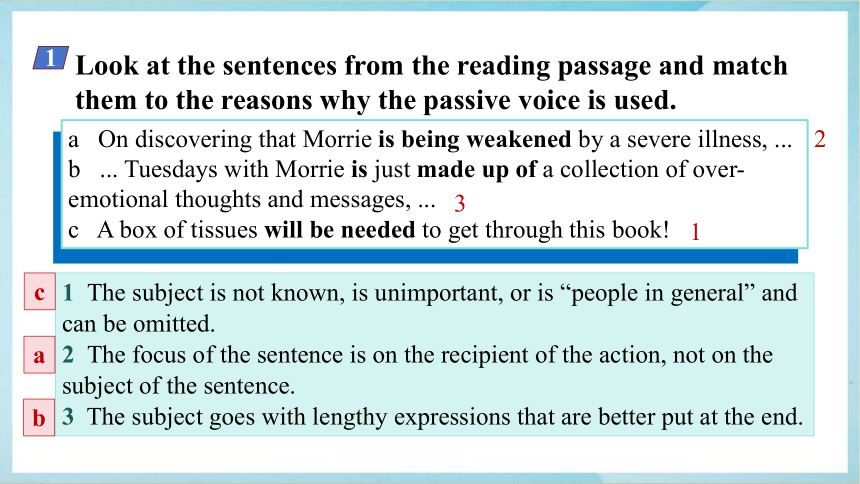
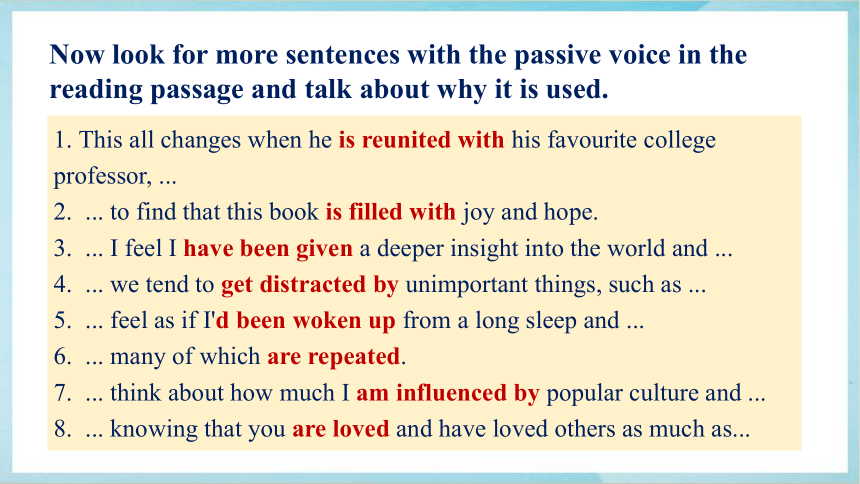
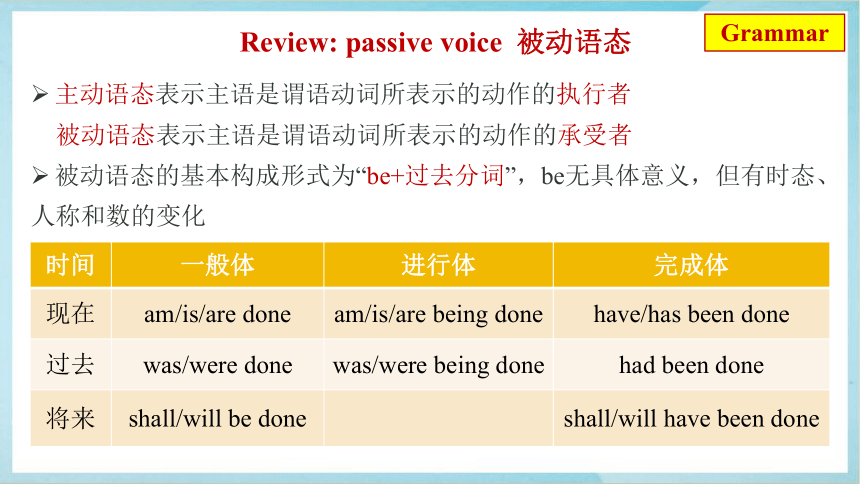
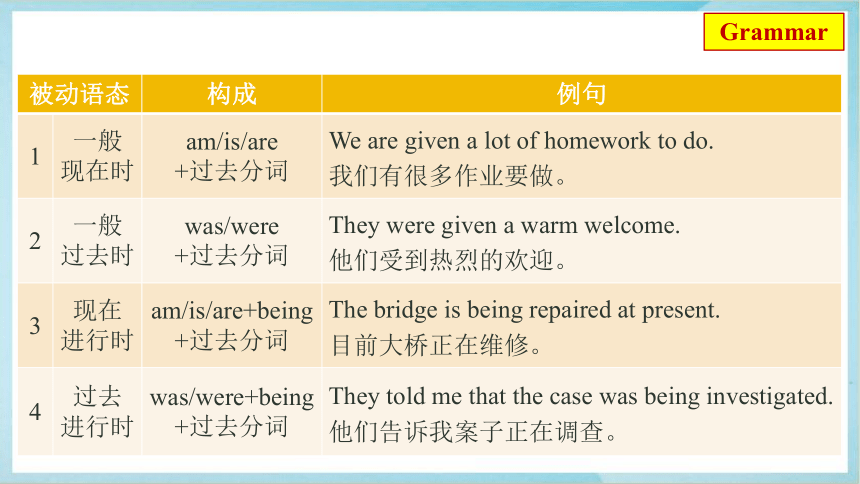
文档简介
(共41张PPT)
Unit 2 Lessons in life
Using language
To review, consolidate and flexibly use the passive voice of verbs in actual contexts, and learn to use the passive voice properly in writing.
To learn and use common proverbs in daily life, understand the meaning of proverbs and use scenarios.
To learn the story of "never too old to learn", experience the meaning of lifelong learning, and cultivate an optimistic outlook on life and values.
Learning objectives
Words and expressions
be reunited with (使)重聚 18
* weaken v. (使)虚弱 18
pessimistic adj. 悲观的,悲观主义的 19
anticipate v. 预期,预料 19
possession n. 财产,财物 19
abnormal adj. 不正常的,反常的 19
widespread adj. 广泛流传的 20
recognition n. 承认,认可 20
phrase n. 成语,习语;警句 22
cooperate v. 合作,协作 24
fee n. 工作酬金,服务费 25
university fees 大学学费 25
重点词汇
1.fee n.
2. n.成语,习语;警句
3. v.合作,协作
工作酬金,服务费
phrase
cooperate
重点短语
1.in general
2.pass on
3.at the end
4.stick to
5.cooperate with
6. 全力以赴
7. 从……毕业
8. 为了
9. 减肥
10. 尽快
总的来说;一般来说
传递
最后,最终
坚持
与……合作
put all one’s efforts into
graduate from
in order to
lose weight
as soon as possible
Review: Passive voice
复习:被动语态
Look at the sentences from the reading passage and match them to the reasons why the passive voice is used.
1
a On discovering that Morrie is being weakened by a severe illness, ...
b ... Tuesdays with Morrie is just made up of a collection of over-emotional thoughts and messages, ...
c A box of tissues will be needed to get through this book!
1 The subject is not known, is unimportant, or is “people in general” and can be omitted.
2 The focus of the sentence is on the recipient of the action, not on the subject of the sentence.
3 The subject goes with lengthy expressions that are better put at the end.
a. On discovering that Morrie is being weakened by a severe illness, ...
一发现莫里因一场严重的疾病变得虚弱后,……
b. ...Tuesdays with Morrie is just made up of a collection of over-emotional thoughts and messages, ...
……《相约星期二》只是一系列过于感性的想法和信息,……
c. A box of tissues will be needed to get through this book!
读这本书时,需要一盒纸巾!
1. The subject is not known, is unimportant, or is “people in general” and can be omitted.
主语不明、不重要或者指“一般的人”,可以省略。
2. The focus of the sentence is on the recipient of the action, not on the subject of the sentence.
句子的重点是动作的承受者,而不是句子的主语。
3. The subject goes with lengthy expressions that are better put at the end.
主语是放在末尾更好的冗长表达的一部分。
Look at the sentences from the reading passage and match them to the reasons why the passive voice is used.
1
a On discovering that Morrie is being weakened by a severe illness, ...
b ... Tuesdays with Morrie is just made up of a collection of over-emotional thoughts and messages, ...
c A box of tissues will be needed to get through this book!
1 The subject is not known, is unimportant, or is “people in general” and can be omitted.
2 The focus of the sentence is on the recipient of the action, not on the subject of the sentence.
3 The subject goes with lengthy expressions that are better put at the end.
c
a
b
1
2
3
Now look for more sentences with the passive voice in the reading passage and talk about why it is used.
1. This all changes when he is reunited with his favourite college professor, ...
2. ... to find that this book is filled with joy and hope.
3. ... I feel I have been given a deeper insight into the world and ...
4. ... we tend to get distracted by unimportant things, such as ...
5. ... feel as if I'd been woken up from a long sleep and ...
6. ... many of which are repeated.
7. ... think about how much I am influenced by popular culture and ...
8. ... knowing that you are loved and have loved others as much as...
时间 一般体 进行体 完成体
现在 am/is/are done am/is/are being done have/has been done
过去 was/were done was/were being done had been done
将来 shall/will be done shall/will have been done
主动语态表示主语是谓语动词所表示的动作的执行者
被动语态表示主语是谓语动词所表示的动作的承受者
被动语态的基本构成形式为“be+过去分词”,be无具体意义,但有时态、
人称和数的变化
Review: passive voice 被动语态
Grammar
被动语态 构成 例句
1 一般 现在时 am/is/are +过去分词 We are given a lot of homework to do.
我们有很多作业要做。
2 一般 过去时 was/were +过去分词 They were given a warm welcome.
他们受到热烈的欢迎。
3 现在 进行时 am/is/are+being +过去分词 The bridge is being repaired at present.
目前大桥正在维修。
4 过去 进行时 was/were+being +过去分词 They told me that the case was being investigated.他们告诉我案子正在调查。
Grammar
被动语态 构成 例句
5 现在 完成时 have/has been +过去分词 The documents have been discovered.
文件已经找到了。
6 过去 完成时 had been +过去分词 He asked if Mary had been sent into hospital.
他问玛丽是否已被送进医院。
7 一般 将来时 will/shall be +过去分词 Check carefully, so any mistake will be caught.
仔细检查一遍,把所有错误都找出来。
8 过去 将来时 would/should be +过去分词 He knew he would be punished for it.
他知道他会为此受到惩罚。
Grammar
被动语态的用法
1. 当我们不知道谁是动作的执行者,或者没有必要指出谁是动作
的执行者时。
Every classroom in this school is being equipped with a new TV set.
在这所学校里,每间教室都正在装备一台新的电视机。
2. 为了强调动作的承受者时。
Visitors are requested not to touch the exhibits.
参观者不可触摸展品。
3. 出于策略、委婉、礼貌等不提出动作的执行者时。
You are said to be active recently.
据说你最近很活跃。
Grammar
4. 在英语口语中,有时可用“get+过去分词”构成被动语态。
I got dressed as quickly as I could.
我尽快穿上衣服。
She got elected after all the efforts she had made.
她尽了一切努力之后当选了。
常见搭配:get arrested, get caught, get confused, get delayed, get divorced, get dressed, get drowned, get drunk, get elected, get engaged, get hit, get killed, get lost, get married, get stuck.
Grammar
被动语态的用法
5. 主动形式表示被动意义。
(1)有些系动词本身含有被动意义,如:taste, sound, prove, feel, look, smell, remain, appear 等。
They often eat in that restaurant because the food there tastes delicious.
他们常到那家菜馆吃饭,因为那里的饭菜可口。
(2)表示主语的某种属性特征的动词,如:read, write, sell, open, shut, begin, wash, wear, cut, lock, play, drive 等。
Books of this kind sell well.
这类书很畅销。
Grammar
被动语态的用法
主动结构 → 被动结构
... do → ... is/ am/ are done
...did → ...was/ were done
... be doing → ...be being done
... will do → ... will be done
... should do → ...should be done
... have/has done → ...have/ has been done
... had done → ...had been done
... will have dome → ...will have been done
Summary
被动语态的构成
使用被动语态的注意事项
1. 不及物动词和联系动词一般不用于被动语态。
2. 感官动词或者使役动词在被动结构中需要加上不定式符号 to, 如:see sb do sth → ____________________。
3. 带介词或副词的动词短语用于被动语态时,不可以丢掉介词或者副词。如: He laughed at the boy → ____________________________________.
4. get + 过去分词可以构成被动结构。
5. 一些表示事物特征或者性质的动词常常用主动形式表示被动意义。 如: sell, write, burn/ break,etc. → _______________________________ .
be seen to do sth
The boy was laughed at by him
The kind of pens writes smoothly
Summary
理解应用
1. The artist was sure that he alone would ____________ (choose), but he failed to be hired by the emperor’s chief minister.
2. That learning is a lifelong process _____________ (express) by education experts.
3. At present, every minute that belongs to us ____________ (make) full use of.
4. I was sent to the town to see how the development plan ________________ (carry) out in the last few years.
5. It _______________ (acknowledge) that every subject is worthy to be
studied hard.
be chosen
is expressed
is made
had been carried
is acknowledged
Consolidation
Fill in the blanks:
Since ancient times, storytelling has been a way to share and pass on(传递) wisdom. One important early work that did so was Aesop’s Fables, a collection of stories that history credits to (把……归功于……) Aesop, a Greek storyteller. People believe that he lived in Ancient Greece between 620 BC and 564 BC. Most of the characters in his stories are animals, (the qualities of which Aesop used to reflect human traits and wisdom)定语从句. Each fable teaches a life lesson (that Aesop summarises in a short phrase(成语,习语,警句) at the end of the story)定语从句, called a moral. Today, children and adults all around the world still enjoy Aesop’s Fables.
自古以来,讲故事就是一种分享和传递智慧的方式。一部这么做的重要的早期作品是《伊索寓言》,这是一部故事集,历史将其归功于一位希腊故事讲述者伊索。人们认为,他生活在公元前620年至公元前564年的古希腊。他的故事中的大部分角色都是动物,而动物的品质正是伊索用来反映人类品质和智慧的。每一个寓言故事都给我们上了人生的一课,伊索在故事的结尾用一个简短的习语总结了这一课,称作寓言。今天,世界各地的儿童和成年人仍然喜欢《伊索寓言》。
Rewrite the paragraph using the passive voice where appropriate.
2
Since ancient times, storytelling has been a way to share and pass on wisdom. One important early work that did so was Aesop’s Fables, a collection of stories that history credits to Aesop, a Greek storyteller. People believe that he lived in Ancient Greece between 620 BC and 564 BC. Most of the characters in his stories are animals, the qualities of which Aesop used to reflect human traits and wisdom. Each fable teaches a life lesson that Aesop summarises in a short phrase at the end of the story, called a moral. Today, children and adults all around the world still enjoy Aesop’s Fables.
has been used
is credited to Aesop, a Greek storyteller, by history.
It is believed
were used to reflect human traits and wisdom by Aesop
Aesop’s Fables is still enjoyed by children and adults
is summarised by Aesop
Rewrite the paragraph using the passive voice where appropriate.
2
One day a little mouse was caught by a lion...
Look at the pictures and write the story from Aesop’s Fables. Use the passive voice where appropriate.
3
One day a little mouse was caught by a lion...
Look at the pictures and write the story from Aesop’s Fables.
Use the passive voice where appropriate.
One day a little mouse was caught by a lion. The lion wanted to eat the mouse, but the mouse said that he would help the lion someday, if he was let go. The lion thought, “How can a great animal be helped by a little animal ” But the mouse was allowed to leave. Several days later, the lion was caught by the hunter’s net. The mouse bit the net with his strong teeth and helped the lion out. Thanks to the little mouse, the lion was saved and finally admitted that the strong could sometimes be helped by the weak.
3
Work in pairs. Tell each other another fable you know and the lesson you have learnt from it. Use the passive voice where appropriate.
Once, a race was organized and the hare was chosen to compete against the tortoise. Everyone expected the hare to win easily because of his speed. However,the hare was overconfident and decided to take a nap during the race. Meanwhile,the tortoise was steadily moving forward without stopping. When the hare was awakened by the crowd's cheers,he was surprised to find that the tortoise had already passed him. Despite the hare trying to catch up, it was too late. Ultimately,the tortoise was declared the winner, teaching everyone that slow and steady wins the race.
4
Sample
Listen and complete the conversations.
5
1 A: Professor Brown, here’s my term paper.Sorry for the delay.
B: That’s OK. _________________, right?
2 A: Maths is really killing me! I’m thinking of giving it up.
B: _______________ You’ll never get your dream job as a market analyst if you don’t stick to it.
3 A: If you want to loose weight, you need to stop eating junk food, and you need to start exercising.
B: OK. I’ll start tomorrow… maybe.
A: Today. Not tomorrow. ____________________________________________
Better late than never
No pain, no gain.
Never put off until tomorrow
what you can do today.
Listen and complete the conversations.
5
4 A: I’m glad you finally got here.
B: My car had a flat tyre on the way. Anyway, ____________________.
5 A: With my brother’s help, I finally completed my biology project!
B: Congratulations. _________________________
6 A: I heard that Mary is going to invest all her money in
this programme.
B: That’s not wise. As people usually say “ _______________
__________________”. I’ll
talk to her as soon as possible.
All’s well that ends well
Two heads are better than one.
Don’t put all of your eggs in one basket
A: Professor Brown, here's my term paper. Sorry for the delay.
B: That's OK. Better late than never, right
A: Maths is really killing me! I'm thinking of giving it up.
B: No pain, no gain. You'll never get your dream job as a market analyst if you don't stick to it.
A: If you want to lose weight, you need to stop eating junk food, and you need to start exercising.
B: OK. I'll start tomorrow... maybe.
A: Today. Not tomorrow. Never put off until tomorrow what you can do today.
A: I'm glad you finally got here.
B: My car had a flat tyre on the way. Anyway, all's well that ends well.
A: With my brother's help, I finally completed my biology project!
B:Congratulations! Two heads are better than one.
A: I heard that Mary is going to invest all her money in this programme.
B: That's not wise. As people usually say, “Don't put all of your eggs in one basket". I'll talk to her as soon as possible.
听力文本1
Match the proverbs in Activity 5 to their meanings.
6
1 _________________: you must face challenges in order to be successful .
2 ________________________: it is easier to achieve something if you cooperate with someone else.
3 __________________: doing something late is better than not doing it at all.
4 ____________________________________________: you should start things earlier rather than later.
5 __________________________________: do not put all your efforts or resources into doing one thing.
6 ____________________: problems don’t matter if the final result is good.
Now work in groups and think of other proverbs about life. Can you find Chinese proverbs with similar meanings
No pain, no gain.
Two heads are better than one.
Better late than ever.
Never put off until tomorrow what you can do today.
Don’t put all of your eggs in one basket.
All’s well that ends well.
Proverbs about life
1. You must face challenges in order to be successful.
2. It is easier to achieve something if you cooperate with someone else.
3. Doing something late is better than not doing it at all.
4. You should start things earlier rather than later.
5. Do not put all your efforts or resources into doing one thing.
6. Problems don’t matter if the final result is good.
No pain, no gain. 一分耕耘,一分收获。(不劳无获。)
Two heads are better than one. 三个臭皮匠,顶个诸葛亮。(人多力量大。)
Better late than ever. 亡羊补牢,未为迟也。
Never put off until tomorrow what you can do today. 今日事,今日毕。
Don’t put all of your eggs in one basket. 不要孤注一掷。
All’s well that ends well. 结果好,样样好。
Work in pairs. Think of other situations to which these proverbs can be applied.
7
在大多数国家,上大学的平均年龄是18岁,但实际上上大学并没有年龄上限。最近,在工作了几年或多年之后上大学的成年学生的数量有所增加。获得剑桥大学硕士学位的年龄最大的人在102岁时获得了法学学位。在中国,江苏省一名88岁的男子大学毕业,成为全国年龄最大的大学毕业生。
不定式短语作后置定语
现在分词短语作结果状语
Listen to the interview and choose the best headline.
8
1 University Fees Are No Barrier to Grandma!
2 Dream Comes True for Graduating Grandma
3 Janet Says “Family First! That’s what matters!”
4 How the Students Experience Has Changed with the Centuries
Listen again and complete the notes.
9
Interview with Janet Rose
Age: ______.
First attended university in: ______
Reason for leaving university: ___________________________.
Reason for going back to university:
____________________________________________
_________________________________.
To take care of her ill mother.
Her daughter suggested she go back to school five years ago and she jumped at the chance
81
1955
Listen again and complete the notes.
9
Interview with Janet Rose
Initial feelings on returning to university:
________________________________________
University major: ____________________
Feelings on graduation: ________________
Advice to others: ________________________
Future plans: ______________________________
She felt a bit nervous at first and she felt so old.
American literature.
She feels great.
You’re never too old to learn.
Starting a master’s degree in the fall.
Now work in pairs and talk about what you can learn from Janet's story.
Interviewer: Last week Janet Rose graduated from South Omaha University with a degree in American literature. There is nothing unusual about that except that Janet is an 81-year-old grandmother. Yesterday we caught up with Janet and asked her to tell us her story. Good morning, Janet. Why did you wait so long to get a degree
Janet: Ha ha! That's a good question and one that nearly everyone asks me. Well, let me see. I started university back in 1955, but in my first year my mother fell very ill and she couldn't help my father run the family business any more. So I went home to Texas to take care of her and to help my father. After that I never really thought about going back to study.
Interviewer: Why not And what changed your mind
Janet: I thought it was too late. But then five years ago my daughter Candy suggested I go back to school and I jumped at the chance.
Interviewer: How did you feel going back to university after all these years
听力文本2--1
Janet: I felt a bit nervous at first. I mean, I was surrounded by all these smart young people with their electronic gadgets, and I felt so old. But the students and teachers were kind to me and I soon got used to the classes. They even let me join some of their activities, and I became good friends with some of them. I soon got used to studying, using online resources as well as reading books and articles. It was hard work, but fun.
Interviewer: So, you have just graduated with a degree in American literature. How does it feel
Janet: It feels great. I am trying to live my life to the full. I don't want to sit around at home all day watching daytime TV.
Interviewer: That's fantastic to hear. Janet, do you have any advice for other senior citizens considering going back to university
Janet: I suggest that if you are thinking of going back to school, do it. You'll find that studying again opens up a new world of opportunity to you. And remember, you're never too old
to learn.
Interviewer: Thank you for your time, Janet. Finally, what are your plans now
Janet: Oh, didn't I say I'm starting a master's degree in the fall.
听力文本2--2
Complete the boxes with the expressions from the interview.
10
I started … back in…
After that I …
But then five years ago, …
I felt … at first.
I suggest that …
Remember …
Talking about experiences
I started… back in…
After that I…
But then five years ago…
I felt… at first.
Giving advice
Giving advice
I suggest that…
Remember, …
Talking about experiences
Work in pairs. Tell each other a story about yourself that can be summarised by a proverb in this section.
11
Now talk about how effectively you and your partner used your own experiences to illustrate your understanding of the proverbs.
Write a story about yourself that can be summarised by a proverb you’re familiar with.
Homework
Here's my story summarized by the proverb "Every cloud has a silver lining":
Once, I failed an important exam and felt very sad. I thought my efforts were wasted. But soon, I got an opportunity to join a special project at school. During the project, I discovered my passion for research. The experience was so enriching that I forgot about the exam failure. In the end, I won an award for the project. It made me realize that every setback brings a new opportunity.
Sample 1
Here's my story summarized by the proverb "Actions speak louder than words":
In high school, I wanted to become the class representative. Many of my classmates also wanted the position and talked about their plans loudly. Instead of just talking, I started taking small actions. I helped clean the classroom, organized study groups, and listened to everyone's problems. Gradually, people noticed my efforts. When the voting day came, I was elected with a huge majority. This experience taught me that true leadership is shown through deeds, not just words.
Sample 2
Unit 2 Lessons in life
Using language
To review, consolidate and flexibly use the passive voice of verbs in actual contexts, and learn to use the passive voice properly in writing.
To learn and use common proverbs in daily life, understand the meaning of proverbs and use scenarios.
To learn the story of "never too old to learn", experience the meaning of lifelong learning, and cultivate an optimistic outlook on life and values.
Learning objectives
Words and expressions
be reunited with (使)重聚 18
* weaken v. (使)虚弱 18
pessimistic adj. 悲观的,悲观主义的 19
anticipate v. 预期,预料 19
possession n. 财产,财物 19
abnormal adj. 不正常的,反常的 19
widespread adj. 广泛流传的 20
recognition n. 承认,认可 20
phrase n. 成语,习语;警句 22
cooperate v. 合作,协作 24
fee n. 工作酬金,服务费 25
university fees 大学学费 25
重点词汇
1.fee n.
2. n.成语,习语;警句
3. v.合作,协作
工作酬金,服务费
phrase
cooperate
重点短语
1.in general
2.pass on
3.at the end
4.stick to
5.cooperate with
6. 全力以赴
7. 从……毕业
8. 为了
9. 减肥
10. 尽快
总的来说;一般来说
传递
最后,最终
坚持
与……合作
put all one’s efforts into
graduate from
in order to
lose weight
as soon as possible
Review: Passive voice
复习:被动语态
Look at the sentences from the reading passage and match them to the reasons why the passive voice is used.
1
a On discovering that Morrie is being weakened by a severe illness, ...
b ... Tuesdays with Morrie is just made up of a collection of over-emotional thoughts and messages, ...
c A box of tissues will be needed to get through this book!
1 The subject is not known, is unimportant, or is “people in general” and can be omitted.
2 The focus of the sentence is on the recipient of the action, not on the subject of the sentence.
3 The subject goes with lengthy expressions that are better put at the end.
a. On discovering that Morrie is being weakened by a severe illness, ...
一发现莫里因一场严重的疾病变得虚弱后,……
b. ...Tuesdays with Morrie is just made up of a collection of over-emotional thoughts and messages, ...
……《相约星期二》只是一系列过于感性的想法和信息,……
c. A box of tissues will be needed to get through this book!
读这本书时,需要一盒纸巾!
1. The subject is not known, is unimportant, or is “people in general” and can be omitted.
主语不明、不重要或者指“一般的人”,可以省略。
2. The focus of the sentence is on the recipient of the action, not on the subject of the sentence.
句子的重点是动作的承受者,而不是句子的主语。
3. The subject goes with lengthy expressions that are better put at the end.
主语是放在末尾更好的冗长表达的一部分。
Look at the sentences from the reading passage and match them to the reasons why the passive voice is used.
1
a On discovering that Morrie is being weakened by a severe illness, ...
b ... Tuesdays with Morrie is just made up of a collection of over-emotional thoughts and messages, ...
c A box of tissues will be needed to get through this book!
1 The subject is not known, is unimportant, or is “people in general” and can be omitted.
2 The focus of the sentence is on the recipient of the action, not on the subject of the sentence.
3 The subject goes with lengthy expressions that are better put at the end.
c
a
b
1
2
3
Now look for more sentences with the passive voice in the reading passage and talk about why it is used.
1. This all changes when he is reunited with his favourite college professor, ...
2. ... to find that this book is filled with joy and hope.
3. ... I feel I have been given a deeper insight into the world and ...
4. ... we tend to get distracted by unimportant things, such as ...
5. ... feel as if I'd been woken up from a long sleep and ...
6. ... many of which are repeated.
7. ... think about how much I am influenced by popular culture and ...
8. ... knowing that you are loved and have loved others as much as...
时间 一般体 进行体 完成体
现在 am/is/are done am/is/are being done have/has been done
过去 was/were done was/were being done had been done
将来 shall/will be done shall/will have been done
主动语态表示主语是谓语动词所表示的动作的执行者
被动语态表示主语是谓语动词所表示的动作的承受者
被动语态的基本构成形式为“be+过去分词”,be无具体意义,但有时态、
人称和数的变化
Review: passive voice 被动语态
Grammar
被动语态 构成 例句
1 一般 现在时 am/is/are +过去分词 We are given a lot of homework to do.
我们有很多作业要做。
2 一般 过去时 was/were +过去分词 They were given a warm welcome.
他们受到热烈的欢迎。
3 现在 进行时 am/is/are+being +过去分词 The bridge is being repaired at present.
目前大桥正在维修。
4 过去 进行时 was/were+being +过去分词 They told me that the case was being investigated.他们告诉我案子正在调查。
Grammar
被动语态 构成 例句
5 现在 完成时 have/has been +过去分词 The documents have been discovered.
文件已经找到了。
6 过去 完成时 had been +过去分词 He asked if Mary had been sent into hospital.
他问玛丽是否已被送进医院。
7 一般 将来时 will/shall be +过去分词 Check carefully, so any mistake will be caught.
仔细检查一遍,把所有错误都找出来。
8 过去 将来时 would/should be +过去分词 He knew he would be punished for it.
他知道他会为此受到惩罚。
Grammar
被动语态的用法
1. 当我们不知道谁是动作的执行者,或者没有必要指出谁是动作
的执行者时。
Every classroom in this school is being equipped with a new TV set.
在这所学校里,每间教室都正在装备一台新的电视机。
2. 为了强调动作的承受者时。
Visitors are requested not to touch the exhibits.
参观者不可触摸展品。
3. 出于策略、委婉、礼貌等不提出动作的执行者时。
You are said to be active recently.
据说你最近很活跃。
Grammar
4. 在英语口语中,有时可用“get+过去分词”构成被动语态。
I got dressed as quickly as I could.
我尽快穿上衣服。
She got elected after all the efforts she had made.
她尽了一切努力之后当选了。
常见搭配:get arrested, get caught, get confused, get delayed, get divorced, get dressed, get drowned, get drunk, get elected, get engaged, get hit, get killed, get lost, get married, get stuck.
Grammar
被动语态的用法
5. 主动形式表示被动意义。
(1)有些系动词本身含有被动意义,如:taste, sound, prove, feel, look, smell, remain, appear 等。
They often eat in that restaurant because the food there tastes delicious.
他们常到那家菜馆吃饭,因为那里的饭菜可口。
(2)表示主语的某种属性特征的动词,如:read, write, sell, open, shut, begin, wash, wear, cut, lock, play, drive 等。
Books of this kind sell well.
这类书很畅销。
Grammar
被动语态的用法
主动结构 → 被动结构
... do → ... is/ am/ are done
...did → ...was/ were done
... be doing → ...be being done
... will do → ... will be done
... should do → ...should be done
... have/has done → ...have/ has been done
... had done → ...had been done
... will have dome → ...will have been done
Summary
被动语态的构成
使用被动语态的注意事项
1. 不及物动词和联系动词一般不用于被动语态。
2. 感官动词或者使役动词在被动结构中需要加上不定式符号 to, 如:see sb do sth → ____________________。
3. 带介词或副词的动词短语用于被动语态时,不可以丢掉介词或者副词。如: He laughed at the boy → ____________________________________.
4. get + 过去分词可以构成被动结构。
5. 一些表示事物特征或者性质的动词常常用主动形式表示被动意义。 如: sell, write, burn/ break,etc. → _______________________________ .
be seen to do sth
The boy was laughed at by him
The kind of pens writes smoothly
Summary
理解应用
1. The artist was sure that he alone would ____________ (choose), but he failed to be hired by the emperor’s chief minister.
2. That learning is a lifelong process _____________ (express) by education experts.
3. At present, every minute that belongs to us ____________ (make) full use of.
4. I was sent to the town to see how the development plan ________________ (carry) out in the last few years.
5. It _______________ (acknowledge) that every subject is worthy to be
studied hard.
be chosen
is expressed
is made
had been carried
is acknowledged
Consolidation
Fill in the blanks:
Since ancient times, storytelling has been a way to share and pass on(传递) wisdom. One important early work that did so was Aesop’s Fables, a collection of stories that history credits to (把……归功于……) Aesop, a Greek storyteller. People believe that he lived in Ancient Greece between 620 BC and 564 BC. Most of the characters in his stories are animals, (the qualities of which Aesop used to reflect human traits and wisdom)定语从句. Each fable teaches a life lesson (that Aesop summarises in a short phrase(成语,习语,警句) at the end of the story)定语从句, called a moral. Today, children and adults all around the world still enjoy Aesop’s Fables.
自古以来,讲故事就是一种分享和传递智慧的方式。一部这么做的重要的早期作品是《伊索寓言》,这是一部故事集,历史将其归功于一位希腊故事讲述者伊索。人们认为,他生活在公元前620年至公元前564年的古希腊。他的故事中的大部分角色都是动物,而动物的品质正是伊索用来反映人类品质和智慧的。每一个寓言故事都给我们上了人生的一课,伊索在故事的结尾用一个简短的习语总结了这一课,称作寓言。今天,世界各地的儿童和成年人仍然喜欢《伊索寓言》。
Rewrite the paragraph using the passive voice where appropriate.
2
Since ancient times, storytelling has been a way to share and pass on wisdom. One important early work that did so was Aesop’s Fables, a collection of stories that history credits to Aesop, a Greek storyteller. People believe that he lived in Ancient Greece between 620 BC and 564 BC. Most of the characters in his stories are animals, the qualities of which Aesop used to reflect human traits and wisdom. Each fable teaches a life lesson that Aesop summarises in a short phrase at the end of the story, called a moral. Today, children and adults all around the world still enjoy Aesop’s Fables.
has been used
is credited to Aesop, a Greek storyteller, by history.
It is believed
were used to reflect human traits and wisdom by Aesop
Aesop’s Fables is still enjoyed by children and adults
is summarised by Aesop
Rewrite the paragraph using the passive voice where appropriate.
2
One day a little mouse was caught by a lion...
Look at the pictures and write the story from Aesop’s Fables. Use the passive voice where appropriate.
3
One day a little mouse was caught by a lion...
Look at the pictures and write the story from Aesop’s Fables.
Use the passive voice where appropriate.
One day a little mouse was caught by a lion. The lion wanted to eat the mouse, but the mouse said that he would help the lion someday, if he was let go. The lion thought, “How can a great animal be helped by a little animal ” But the mouse was allowed to leave. Several days later, the lion was caught by the hunter’s net. The mouse bit the net with his strong teeth and helped the lion out. Thanks to the little mouse, the lion was saved and finally admitted that the strong could sometimes be helped by the weak.
3
Work in pairs. Tell each other another fable you know and the lesson you have learnt from it. Use the passive voice where appropriate.
Once, a race was organized and the hare was chosen to compete against the tortoise. Everyone expected the hare to win easily because of his speed. However,the hare was overconfident and decided to take a nap during the race. Meanwhile,the tortoise was steadily moving forward without stopping. When the hare was awakened by the crowd's cheers,he was surprised to find that the tortoise had already passed him. Despite the hare trying to catch up, it was too late. Ultimately,the tortoise was declared the winner, teaching everyone that slow and steady wins the race.
4
Sample
Listen and complete the conversations.
5
1 A: Professor Brown, here’s my term paper.Sorry for the delay.
B: That’s OK. _________________, right?
2 A: Maths is really killing me! I’m thinking of giving it up.
B: _______________ You’ll never get your dream job as a market analyst if you don’t stick to it.
3 A: If you want to loose weight, you need to stop eating junk food, and you need to start exercising.
B: OK. I’ll start tomorrow… maybe.
A: Today. Not tomorrow. ____________________________________________
Better late than never
No pain, no gain.
Never put off until tomorrow
what you can do today.
Listen and complete the conversations.
5
4 A: I’m glad you finally got here.
B: My car had a flat tyre on the way. Anyway, ____________________.
5 A: With my brother’s help, I finally completed my biology project!
B: Congratulations. _________________________
6 A: I heard that Mary is going to invest all her money in
this programme.
B: That’s not wise. As people usually say “ _______________
__________________”. I’ll
talk to her as soon as possible.
All’s well that ends well
Two heads are better than one.
Don’t put all of your eggs in one basket
A: Professor Brown, here's my term paper. Sorry for the delay.
B: That's OK. Better late than never, right
A: Maths is really killing me! I'm thinking of giving it up.
B: No pain, no gain. You'll never get your dream job as a market analyst if you don't stick to it.
A: If you want to lose weight, you need to stop eating junk food, and you need to start exercising.
B: OK. I'll start tomorrow... maybe.
A: Today. Not tomorrow. Never put off until tomorrow what you can do today.
A: I'm glad you finally got here.
B: My car had a flat tyre on the way. Anyway, all's well that ends well.
A: With my brother's help, I finally completed my biology project!
B:Congratulations! Two heads are better than one.
A: I heard that Mary is going to invest all her money in this programme.
B: That's not wise. As people usually say, “Don't put all of your eggs in one basket". I'll talk to her as soon as possible.
听力文本1
Match the proverbs in Activity 5 to their meanings.
6
1 _________________: you must face challenges in order to be successful .
2 ________________________: it is easier to achieve something if you cooperate with someone else.
3 __________________: doing something late is better than not doing it at all.
4 ____________________________________________: you should start things earlier rather than later.
5 __________________________________: do not put all your efforts or resources into doing one thing.
6 ____________________: problems don’t matter if the final result is good.
Now work in groups and think of other proverbs about life. Can you find Chinese proverbs with similar meanings
No pain, no gain.
Two heads are better than one.
Better late than ever.
Never put off until tomorrow what you can do today.
Don’t put all of your eggs in one basket.
All’s well that ends well.
Proverbs about life
1. You must face challenges in order to be successful.
2. It is easier to achieve something if you cooperate with someone else.
3. Doing something late is better than not doing it at all.
4. You should start things earlier rather than later.
5. Do not put all your efforts or resources into doing one thing.
6. Problems don’t matter if the final result is good.
No pain, no gain. 一分耕耘,一分收获。(不劳无获。)
Two heads are better than one. 三个臭皮匠,顶个诸葛亮。(人多力量大。)
Better late than ever. 亡羊补牢,未为迟也。
Never put off until tomorrow what you can do today. 今日事,今日毕。
Don’t put all of your eggs in one basket. 不要孤注一掷。
All’s well that ends well. 结果好,样样好。
Work in pairs. Think of other situations to which these proverbs can be applied.
7
在大多数国家,上大学的平均年龄是18岁,但实际上上大学并没有年龄上限。最近,在工作了几年或多年之后上大学的成年学生的数量有所增加。获得剑桥大学硕士学位的年龄最大的人在102岁时获得了法学学位。在中国,江苏省一名88岁的男子大学毕业,成为全国年龄最大的大学毕业生。
不定式短语作后置定语
现在分词短语作结果状语
Listen to the interview and choose the best headline.
8
1 University Fees Are No Barrier to Grandma!
2 Dream Comes True for Graduating Grandma
3 Janet Says “Family First! That’s what matters!”
4 How the Students Experience Has Changed with the Centuries
Listen again and complete the notes.
9
Interview with Janet Rose
Age: ______.
First attended university in: ______
Reason for leaving university: ___________________________.
Reason for going back to university:
____________________________________________
_________________________________.
To take care of her ill mother.
Her daughter suggested she go back to school five years ago and she jumped at the chance
81
1955
Listen again and complete the notes.
9
Interview with Janet Rose
Initial feelings on returning to university:
________________________________________
University major: ____________________
Feelings on graduation: ________________
Advice to others: ________________________
Future plans: ______________________________
She felt a bit nervous at first and she felt so old.
American literature.
She feels great.
You’re never too old to learn.
Starting a master’s degree in the fall.
Now work in pairs and talk about what you can learn from Janet's story.
Interviewer: Last week Janet Rose graduated from South Omaha University with a degree in American literature. There is nothing unusual about that except that Janet is an 81-year-old grandmother. Yesterday we caught up with Janet and asked her to tell us her story. Good morning, Janet. Why did you wait so long to get a degree
Janet: Ha ha! That's a good question and one that nearly everyone asks me. Well, let me see. I started university back in 1955, but in my first year my mother fell very ill and she couldn't help my father run the family business any more. So I went home to Texas to take care of her and to help my father. After that I never really thought about going back to study.
Interviewer: Why not And what changed your mind
Janet: I thought it was too late. But then five years ago my daughter Candy suggested I go back to school and I jumped at the chance.
Interviewer: How did you feel going back to university after all these years
听力文本2--1
Janet: I felt a bit nervous at first. I mean, I was surrounded by all these smart young people with their electronic gadgets, and I felt so old. But the students and teachers were kind to me and I soon got used to the classes. They even let me join some of their activities, and I became good friends with some of them. I soon got used to studying, using online resources as well as reading books and articles. It was hard work, but fun.
Interviewer: So, you have just graduated with a degree in American literature. How does it feel
Janet: It feels great. I am trying to live my life to the full. I don't want to sit around at home all day watching daytime TV.
Interviewer: That's fantastic to hear. Janet, do you have any advice for other senior citizens considering going back to university
Janet: I suggest that if you are thinking of going back to school, do it. You'll find that studying again opens up a new world of opportunity to you. And remember, you're never too old
to learn.
Interviewer: Thank you for your time, Janet. Finally, what are your plans now
Janet: Oh, didn't I say I'm starting a master's degree in the fall.
听力文本2--2
Complete the boxes with the expressions from the interview.
10
I started … back in…
After that I …
But then five years ago, …
I felt … at first.
I suggest that …
Remember …
Talking about experiences
I started… back in…
After that I…
But then five years ago…
I felt… at first.
Giving advice
Giving advice
I suggest that…
Remember, …
Talking about experiences
Work in pairs. Tell each other a story about yourself that can be summarised by a proverb in this section.
11
Now talk about how effectively you and your partner used your own experiences to illustrate your understanding of the proverbs.
Write a story about yourself that can be summarised by a proverb you’re familiar with.
Homework
Here's my story summarized by the proverb "Every cloud has a silver lining":
Once, I failed an important exam and felt very sad. I thought my efforts were wasted. But soon, I got an opportunity to join a special project at school. During the project, I discovered my passion for research. The experience was so enriching that I forgot about the exam failure. In the end, I won an award for the project. It made me realize that every setback brings a new opportunity.
Sample 1
Here's my story summarized by the proverb "Actions speak louder than words":
In high school, I wanted to become the class representative. Many of my classmates also wanted the position and talked about their plans loudly. Instead of just talking, I started taking small actions. I helped clean the classroom, organized study groups, and listened to everyone's problems. Gradually, people noticed my efforts. When the voting day came, I was elected with a huge majority. This experience taught me that true leadership is shown through deeds, not just words.
Sample 2
